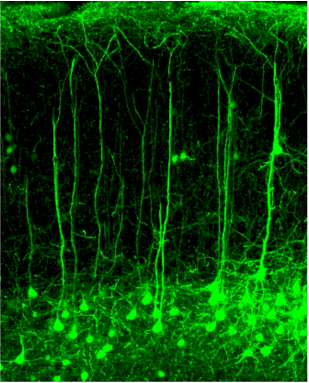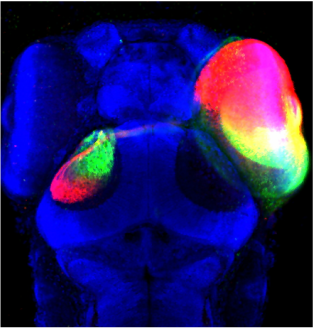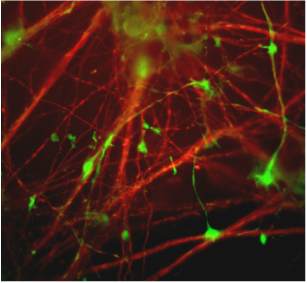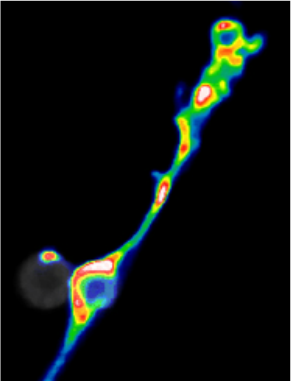Faculty in the Center for Childhood Neurotherapeutics
 Mouse cerebral cortex with Layer 4/5 neurons expressing GFP (Lizarraga lab)
Mouse cerebral cortex with Layer 4/5 neurons expressing GFP (Lizarraga lab)
Dr. Sofia Lizarraga joined the Department of Biological Sciences as Assistant Professor in 2015. Her laboratory aims to understand the cellular and molecular mechanisms that underlie the establishment of neuronal connectivity during normal brain development and in the disease brain. Her group use human neurons derived from induced pluripotent stem cells (iPSCs) obtained from patients with neurodevelopment disorders (i.e., autism, intellectual disability) as a model system.
email - [email protected]
laboratory/office - EWS Building, Rm 712 (temporary)
link to publications
email - [email protected]
laboratory/office - EWS Building, Rm 712 (temporary)
link to publications
 Zebrafish brain showing retinal projection axons in red & green (Poulain lab)
Zebrafish brain showing retinal projection axons in red & green (Poulain lab)
Dr. Fabienne Poulain joined the Department of Biological Sciences as Assistant Professor in 2015. Her laboratory aims to understand the cellular and molecular mechanisms for axon pathfinding and selective degeneration leading to the formation and maintenance of functional brain circuits. Her studies use zebrafish as a model system and a unique combination of genetic, embryological and live imaging approaches to observe and manipulate axons directly in the embryo in vivo.
email - [email protected]
laboratory/office - Jones Physical Sciences Building, Rm 517
link to publications
email - [email protected]
laboratory/office - Jones Physical Sciences Building, Rm 517
link to publications
 Cortical neurons showing Lis1 protein in growth
cones & Ac-tubulin in the axon shaft (Smith lab)
Cortical neurons showing Lis1 protein in growth
cones & Ac-tubulin in the axon shaft (Smith lab)
Dr. Deanna Smith is an Associate Professor in the Department of BIological Sciences. A goal of her research is to understand how axonal transport is regulated by intracellular signaling through protein complex formation. Part of her group focuses on the Lis1 gene. Lis1 is critical for brain development, and reduced expression in humans causes neuronal migration disorders characterized by severe epilepsy and mental disabilities. Another focus in the lab is to evaluate potential roles for Lis1 in mature neurons.
email - [email protected]
laboratory/office - Coker Life Sciences Building, Rm 607
link to publications
email - [email protected]
laboratory/office - Coker Life Sciences Building, Rm 607
link to publications
 Distal axon with localized protein synthesis (Twiss lab)
Distal axon with localized protein synthesis (Twiss lab)
Dr. Jeff Twiss joined the University in 2013 as Professor of Biological Sciences and SmartState Endowed Chair in Childhood Neurotherapeutics. His laboratory aims to understand the cellular and molecular mechanisms of axon growth and regeneration. The ultimate goal of their work is to uncover new strategies to encourage neural repair. They use rodent and cell culture models of neural development and injury, applying molecular, cellular, and biochemical approaches to dissect axon growth mechanisms.
email - [email protected]
laboratory/office - Coker Life Sciences Building, Rm 705 & 707
link to publications
email - [email protected]
laboratory/office - Coker Life Sciences Building, Rm 705 & 707
link to publications

